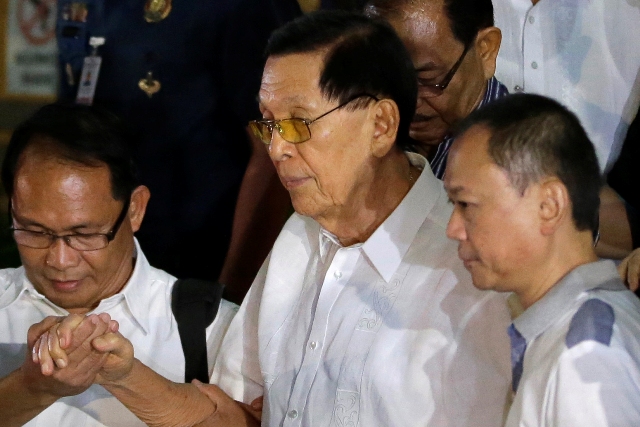Enrile supports Cha-cha, martial law extension

MANILA, Philippines — Former Senate President Juan Ponce Enrile expressed his support on the Congress' plan to prioritize amending the Constitution to pave way for the country's shift to a federal system of government.
In a chance interview with reporters Friday afternoon, Enrile said changing the country's 1987 Constitution is long overdue as many of its provisions is counter-productive especially in terms of improving the economy and the efficiency of government services.
“To be sure, there are many things in the Constitution that we have now which ought to be changed. Our form of government is quite inefficient, for one,” Enrile said.
Enrile had earlier said that he is in favor of changing the country's form of government from the current presidential to federal as by doing so, “economic improvement would be faster and the society would be more in control.”
Talks about amending the Constitution heats up after President Rodrigo Duterte prodded his allies in the House of Representatives.
Since the campaign period, Duterte had been vocal on his intention to push for federalism, saying that it would allow local government units greater self-sufficiency and autonomy.
Enrile, meanwhile, said that should the Congress decides to amendment the Constitution through a constitutional assembly (con-ass), the Senate and House must have a separate voting.
“The people who drafted the 1987 constitution were careless. They did not clearly specify the manner of voting of the two houses, although if I were asked, they have to vote separately. They are two houses, they have two rules, they have two quorums, they have two presiding officers, they have to maintain their distinctness,” Enrile said.
“It cannot be otherwise, otherwise you do not need the Senate to be in the Batasan Pambansa to be in the proceedings because it’s the question of numbers,” he added.
Several senators have earlier said that should the Charter change be made through con-ass the Senate and the House must conduct a separate voting on the amendments before convening in a bicameral conference.
Whatever amendments are approved would then be presented to the electorate for its concurrence through a plebiscite.
Another mode of changing the Constitution is through the constitutional convention (con-con), in which, the delegates who would amend the Constitution would have to be elected.
Election experts have estimated that electing con-con delegates nationwide would cost at least P6 billion, while maintaining the convention, its secretariat and offices and paying for the expenses of delegates would entail about P3 billion a year.
As to the issue of possible postponement of the 2019 mid-term elections, Enrile dismissed the idea as far-fetched, unless the Constitution is amend before next year's election.
“There can only be a no election if you amend the Constitution. Nobody can postpone it, because the Constitution establishes the period of electing leaders of the country,” he said.
The speculations that the administration is pushing for a shift to federalism in order to extend Duterte's term, Enrile said: “They have to amend the Constitution. Anything is possible if you amend the constitution...Anything is possible provided it’s approved by the people.”
“The Constitution is the function of the sovereign people of the republic. It’s not the function of any politician,” he added.
Martial law extension
Enrile, meanwhile, said Duterte made the right move of extending the martial law in Mindanao until the end of 2018, even after the government had already regained control over Marawi City, which was seized by the Islamic State-inspired local terrorist group Maute in May last year.
“Marawi was just a battle. The fact that the government has succeeded in controlling the situation in that battle has not solved the problem. The problem is still there,” Enrile said.
“Don't kid yourselves, if you do not have a system to control the situation it will explode again. The president was correct [in extending martial law],” he added.
It can be remembered that Duterte declared a 60-day martial law in Mindanao on May 23,2017 after the Maute seiged Marawi City to establish a caliphate there.
The effectivity of the martial rule has lapsed on July 22, but upon the request of the Malacañang, was extended by Congress until Dec. 31, 2017. But before the extension had lapsed Duterte requested Congress to allow martial rule's imposition in Mindanao until Dec. 31, 2018.
The House and the Senate in the vote of 240-27 granted the president's request in a joint session on December 13 last year.
On Friday, former Commission on Human Rights chairperson Loretta Ann “Etta” Rosales filed before the Supreme Court the third petition against martial law extension. Rosales said there is no longer any factual or legal basis for the continued imposition of martial rule in Mindanao as Duterte had already declared Marawi City liberated from terrorist threats in October last year.
On December 27, several opposition congressmen led by Representatives Edcel Lagman, Edgar Erice, Teddy Brawner Baguilat Jr., Gary Alejano and Tomasito Villarin filed at the SC the first petition against the one-year martial law extension.
The National Union of Peoples’ Lawyers and the House's Makabayan bloc composed of party-list congressmen Carlos Zarate (Bayan Muna), Emmie De Jesus (Gabriela), Arlene Brosas (Gabriela), Ariel Casilao (Anakpawis), Antonio Tinio (ACT Teachers) and Sarah Elago (Kabataan), filed the second petition on January 8
The SC set the oral arguments on the petitions on January 16 and 17.
Related video:
- Latest
- Trending





























